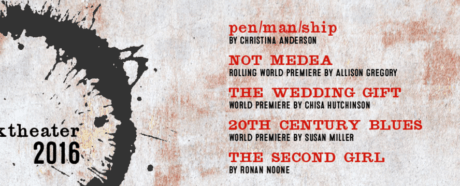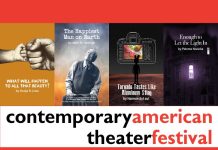The Contemporary American Theater Festival at Shepherd University in Shepherdstown, West Virginia, is approaching its second quarter of a century of new American plays. This year’s rotating repertory includes:
Christina Anderson’s pen/man/ship
Allison Gregory’s Not Medea
Chisa Hutchinson’s The Wedding Gift
Susan Miller’s 20th Century Blues
Ronan Noone’s The Second Girl
Ed Herendeen remains the Festival’s vibrant, alive-with-enthusiasm Artistic Director. The years have not diminished his capacity for wonder.
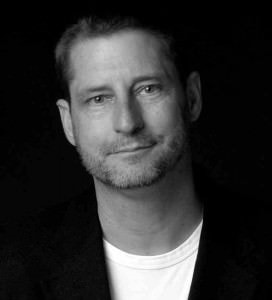
I had the opportunity to speak with Ed about this upcoming Festival that begins July 8th and runs through the end of the month. In particular, I wanted to know about the process that drives him each year as he struggles to arrive at those five scripts, or rather those five stories, that will give breath and definition to the audience’s festival experience.
I’ve attended the Festival on many occasions and have always been struck by the diversity of stories: not just in terms of theme and style, but also in relationship to perspective.
Ed didn’t need a Women’s Voices Theatre Festival to remind him that women’s stories are as important as men’s. Of the one hundred plus new plays CATF has produced over its first 25 years almost half have been written by women.
And stories from people of color–I don’t know the statistics on that – but of the several Festivals I’ve attended in recent years playwrights of color have clearly found a home.
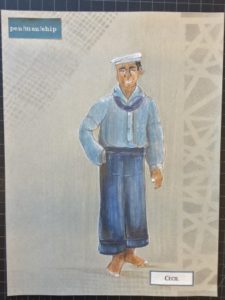
As always, this year’s collection of five tales promises a wonderful diversity of themes, perspectives, and styles.
Of this year’s 5 playwrights, 4 are female, 2 of whom are women of color. If you are familiar with the work at CATF, you will recognize Christina Anderson and Chisa Hutchinson from recent seasons, The Ashes Under Gait City and Dead and Breathing, respectively. The work of Allison Gregory, Susan Miller, and Ronan Noone, on the other hand, is new to the Festival.
Believe it or not, however, this diversity of perspective is not a part of Ed Herendeen’s equation when he sits down to build a festival each year. At the core of his selection process lies his gut reaction to a script’s story: does its situation excite him, emotionally and intellectually–and yes, theatrically. Lucky for theatre-goers, Ed’s gut must be as diverse as his theatrical universe.
The process starts in earnest in the Fall: as one festival ends, the next festival begins, with a trip to the larger agencies that represent America’s most successful playwrights.
Over the years Ed has build an extensive network of relations with agencies like BretAdamsLtd: Artists’ Agency, ICM Partners, The Gersh Agency–to name but a few. Ed hears their pitches for scripts looking for a home.
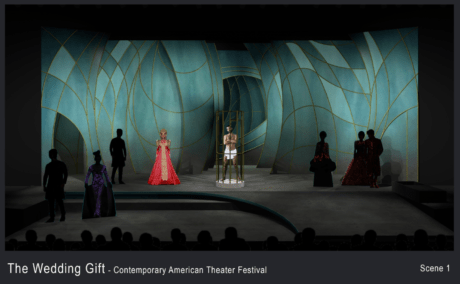
This year was a bit different in that last year Ed had heard of Chisa Hutchinson’s provocative comic drama The Wedding Gift, and he wanted to produce it, but its production requirements had not fit into the festival’s overall ensemble dynamics. So he had to wait.
This year, however, he selected The Wedding Gift as the first piece in his five-piece theatrical puzzle. This year, he would build the acting ensemble around its requirements.
And that’s an important aspect of the script selection process. Because the five stories told at the CATF Festival are performed in rep, actors frequently perform in more than one production. If a script’s requirements fall outside that year’s ensemble, it probably won’t be produced–that year.
In the spring I had the pleasure of hearing Hutchinson share a short section of her play The Wedding Gift with a DC audience, and it’s easy to understand why it would command such attention.
Its premise is indeed a stroke of genius. A man wakes up one morning in a strange land where he doesn’t know the language. He’s at a wedding, not as a guest or even as the groom; but as the gift. You can only imagine the twists and turns that might spring from that situation.
Beyond a script’s ability to excite a reader’s imagination with its possibilities and the overall needs of that season’s acting ensemble, when constructing a season Ed also has to consider Shepherd University’s three theaters and their unique strengths (and weaknesses) as performance venues.
The Wedding Gift’s seven-person cast will perform in the 420-seat Frank Center, with its traditional proscenium orientation.
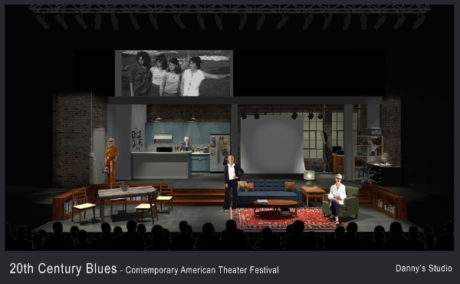
Susan Miller’s 20th Century Blues will also take place at the Center, and its epic clash between the personal and the historical requires no less. The production will use projections that cover 40 years of American history, from rock and roll to space exploration to human rights. The six-person cast will unfold the lives of the characters beneath that historic backdrop.
Two scripts, Anderson’s pen/man/ship and Noone’s The Second Girl, are technically not world premieres in that they were produced prior to the festival, pen/man/ship at San Franscisco’s Magic Theatre and The Second Girl at Boston’s Huntington Theatre Company. Nevertheless, these scripts have received substantial rewrites; thus, their stories will have a decidedly fresh presentation during this second chance opportunity.
Both of these scripts, with their somewhat smaller casts, will be mounted at the 180-seat Marinoff Theater, which has flexible seating that is usually arranged “in-the-round”.
The third venue in the CATF Festival is Studio 112. Intimate, with fewer than a hundred seats, this space is perfect for a small cast show like Not Medea, which explores in not so gentle terms love and motherhood and a lot of something more.
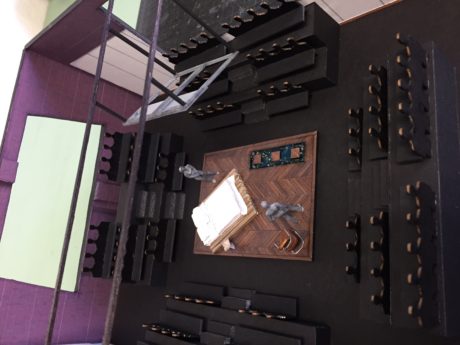
Not Medea also represents another important aspect of CATF’s new play puzzle. The script is part of the National New Play Network’s Rolling World Premieres Program. In this program, new plays are produced through a collaboration process between three or more theaters. For Not Medea, CATF, B Street Theatre in Sacramento, California, and Perseverance Theatre in Anchorage/Juneau Alaska have collaborated in its design and construction. Then, each venue offers a world premiere (hence “rolling”) of the script. Steven Dietz’s On Clover Road and Tom Gibbons’ Uncanny Valley were Rolling World Premieres at CATF in the last two years.
To be sure, all theaters are defined by the stories they tell, but a theater that only produces new work (or recently produced work), knows that “Story isn’t everything–it’s the only thing.” Thus, there are very few celebrity playwrights to cover up a dud of a story.
Fortunately, for CATF and its audiences, Ed’s gut has been right far more times than its been wrong. Not only does CATF have a knack for finding those psychologically provocative tales that quirk your mind to odd directions, but it also has three unique venues, which guarantee stylistic diversity.
In the end, each Festival proves itself a snapshot of America’s theatrical culture, not necessarily of the stories it tells, but of the stories that it wants to tell: the new stories, the emergent stories, the stories that have not yet found a theatre willing to take a chance on their “perhaps too provocative” vision of the world we live in.
With this year’s Festival just around the corner, I’m already brimming with anticipation.
The Festival plays from July 8-31, 2016 at The Contemporary American Theater Festival’s Frank Center Stage – 260 University Drive in Shepherdstown, West Virginia. For tickets, call the box office at (800) 999-CATF or (304) 876-3473, or purchase them online.
LINKS:
Contemporary American Theater Festival (CATF) Playwrights Interviews: Part 1: Susan Miller and “20th Century Blues” by Sharon J. Anderson.
Contemporary American Theater Festival (CATF) Playwrights’ Interviews: Part 2: Christina Anderson and “pen/man/ship” by Sharon J. Anderson.
Contemporary American Theater Festival (CATF) Playwrights Interviews: Part 3: Allison Gregory and “Not Medea” by Sharon J. Anderson.
Susan Miller’s website.
Sharon J. Anderson’s website.
Allison Gregory’s website.
The Contemporary American Theater Festival’s website.


